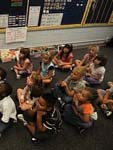







Introduction What About Freire? The Pink Monkey Psst! Wanna Buy A...? And His Pants Are Ugly Conclusions Opinions References and Credits |
In
Chapter 3, “Negotiated Identities: Online Paper Mills, Student
Authorship, and First-Year Composition,” Ritter extends Chapter 2’s
ideas to explore how students decide whether or not to
plagiarize—specifically, whether or not to buy papers online. For
Ritter, students’ decreased reliance on a classroom teacher for
learning problematizes their sense of what academic integrity
means. Students remain, however, very much aware that teachers are
gatekeepers, the arbiters who determine their academic and, by
extension, economic success. This success is what they arguably
think most about when deciding whether or not to buy a paper
online—since, as Ritter points out, the whole notion of authorship is
debased for students, taken out of the picture by the meaninglessness
of the writing tasks they are usually asked to perform in
school. The chapter draws on research Ritter conducted at two similar institutions where she was a faculty member: Southern Connecticut State University and the University of North Carolina-Greensboro. At both institutions, Ritter surveyed first-year composition students to ascertain their attitudes toward authorship, and got similar results even though the surveys were conducted seven years apart. Most of the students she surveyed did not see the papers they wrote in school as having any use outside the classroom, did not share faculty definitions and perceptions of what constitutes authorship, and did not feel that the writing they did in first-year composition was representative of their writerly selves. (Ritter contrasts this perception with the agency students obviously feel on PinkMonkey.com, where they take great care to defend and articulate their positions and opinions.) Nor did the students Ritter surveyed regard Internet postings, or other types of writing found online, "as ‘authored’ material” (p. 89); this includes papers on online paper mills. In addition to the problematics of authorship mentioned earlier, this phenomenon is due in part to the increased commodification of education: if you can buy an education, why not a paper? |